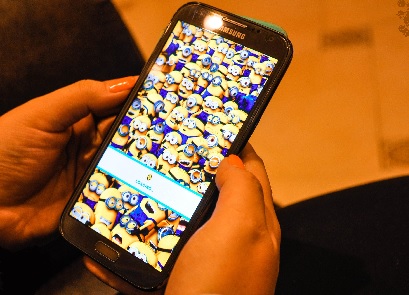Mobile gamers spend an average of two hours playing mobile games, daily.
According to the recently published NPD Group’s Mobile Gaming 2014 report, mobile users are spending more time playing games on their tablets or smartphones now (an average of two hours per day) compared to two years ago (an average of 80 minutes a day).
Between 2012 and 2014 the amount of time consumers spent playing mobile games increased by 57 percent.
The latest mobile gaming survey from NPD Group included 5,566 participants that varied in age (U.S. gamers aged 2 years and older). The participants answered online survey questions, with those who were under the age of 18, requiring parental guidance to complete the survey.
The report found that mobile consumers who spend the most time gaming per day are those aged six to 44. That being said, it was found that children just under 13 (tweens) tend to have the longest gaming sessions. In addition, the survey discovered that children aged two to 12 years are playing more games (an average of five) and are the group that is also the most likely to play paid games.
Tablets appear to be driving the mobile gaming trend.
 Although tablets lack the popularity of smartphones and affordable notebooks, the survey discovered that when it comes to gaming, tablets are not only thriving, but they are the gadgets that appear to be driving the gaming trend among mobile devices.
Although tablets lack the popularity of smartphones and affordable notebooks, the survey discovered that when it comes to gaming, tablets are not only thriving, but they are the gadgets that appear to be driving the gaming trend among mobile devices.
In fact, tablet users play more mobile games and play these games for longer than iPod Touch and smartphone users. They are also far more likely to purchase game apps and make in-app purchases compared to smartphone and Touch owners.
Nevertheless, the fact that tablets seem to be the leading mobile gaming device isn’t all that surprising when considering the research that was conducted by NPD Group, which looked at the device habits of both adults and children. After all, the group that was found to spend the most time playing games, playing more games and playing paid games, were children. Thus, it is less likely that participants in this group would have a personal smatphone device. It is far more likely that these children would play their games on a family tablet and not on a parent’s personal smartphone.
Mobile games represent some risks for young consumers
As mobile devices become increasingly common among children, their exposure to mobile games is skyrocketing. This trend has not gone unnoticed by the game industry, of course, as many developers fashion games to specifically appeal to young consumers. While this practice is not often criticized, there are dangers that exist in the world of mobile gaming that could be considered to be exploitative to young children. In-game advertising is one such danger, as children often engage in ads that collect personal information from the users of mobile devices. In-game purchases are also another danger and it is not uncommon for children to spend significant amounts of their parent’s money while playing mobile games.
Patent outlines software system from Microsoft
The U.S. Patent and Trademark Office has made public a patent application from Microsoft that may help mitigate the dangers that face children in the realm of mobile games. The patent outlines a centralized system throughout which parents can monitor and restrict the activities of a mobile device. This could help parents keep their children from engaging in advertisements that collect personal information and keep these children from making frivolous purchases in their favorite mobile games.
 Software could restrict features of nearly any mobile device
Software could restrict features of nearly any mobile device
According to the patent, the software system can be set up on nearly any mobile device. The software will be able to monitor the activity of this mobile device and can alert parents when these devices are being used overnight or when a child visits a website that is considered off-limits. The software can also restrict the capabilities of a smartphone, allowing children to only call their parents or make use of emergency numbers. The system could also place major restrictions on the features of smartphones and tablets during school hours.
Lawmakers work to mitigate risks associated with mobile games
While mobile games are not malicious by nature, there are relatively few restrictions in place that are meant to protect the privacy of young consumers and limit the amount of money they can spend on these mobile games. In the U.S., federal lawmakers are working to improve security standards in order to ensure that mobile games do not exploit children and young adults.
 Although tablets lack the popularity of smartphones and affordable notebooks, the survey discovered that when it comes to gaming, tablets are not only thriving, but they are the gadgets that appear to be driving the gaming trend among mobile devices.
Although tablets lack the popularity of smartphones and affordable notebooks, the survey discovered that when it comes to gaming, tablets are not only thriving, but they are the gadgets that appear to be driving the gaming trend among mobile devices.
 Software could restrict features of nearly any mobile device
Software could restrict features of nearly any mobile device